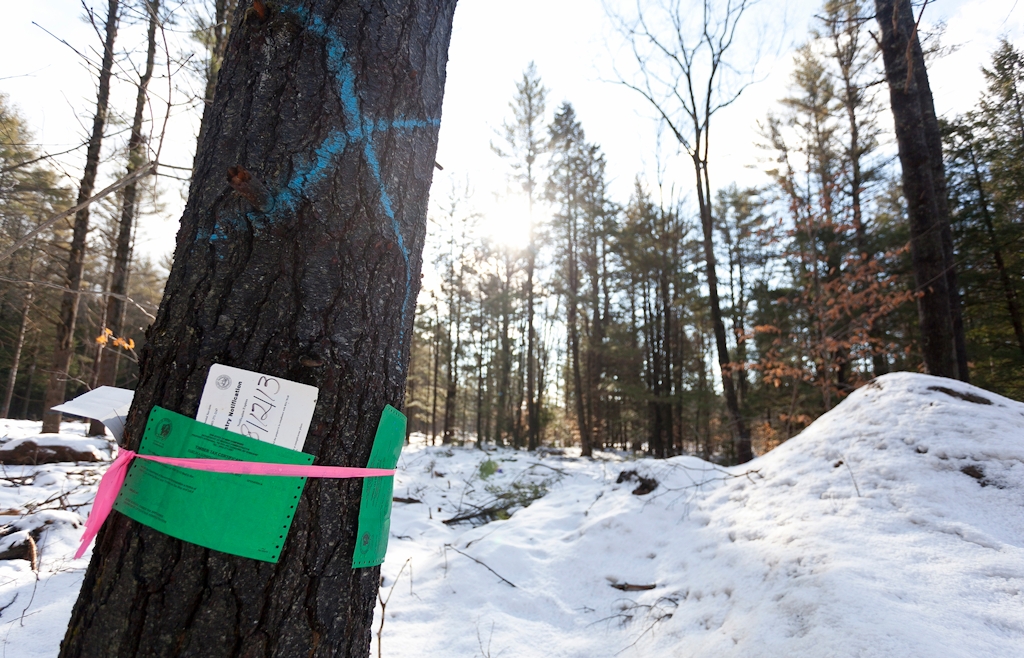A unique coalition of New England scientists, economists, large commercial forest landowners, and environmental nonprofits called the Forest Carbon for Commercial Landowners (FCCL) Initiative has released a report stating northern Maine’s commercial forestlands could store at least 20 percent more carbon each year by changing forest management practices, and without reducing harvest levels.
“I’m pleased the Initiative has accomplished its primary goal by conducting this important analysis, and that Maine and the region will benefit from quality science,” said Alec Giffen, New England Forestry Foundation (NEFF) Senior Forest Science and Policy Fellow, and a coauthor of the report. “It’s not every day such a diverse group of people and organizations agree to work together to model and understand the opportunity for meeting climate objectives alongside continued production of sustainable wood products.”
The FCCL Initiative commissioned a study from the University of Maine to determine whether an increase in carbon storage through changed forestry practices was possible, and, if so, how much it might cost to incentivize landowners to implement this type of climate-aligned forestry. The study area was 7.6 million acres, and Maine’s actual commercial forestlands total approximately 10 million acres.
“Given the scale of the forestlands in question, it’s crucial that we put them to work in the fight against climate change,” said Giffen. “The study shows that these lands can store more carbon, and researchers have also determined incentive rates that can work for landowners and that are more affordable than other standard approaches to reducing carbon emissions.”
The report acknowledges carbon capture is not the only priority to be considered when deciding how to manage forests, and the forestry approaches it models are not intended to optimize for all forest-based values like the protection of wildlife habitat and biodiversity. A wholistic systems approach that includes improved forest management, increased protection of wildlands, and building with climate-smart wood to substitute for carbon-intensive steel and concrete are all required to address the combination of ecological, climate and societal values.
The study only considered forest management scenarios that kept wood production at current levels to avoid negative impacts on rural Maine communities and to prevent leakage, or the spillover of in-forest carbon sequestration gains and losses from one economic market to another. For example, if the United States or a region within the U.S. reduced the amount of wood it produced, any progress it claimed to make in reducing global atmospheric CO2 levels by storing more carbon in its unharvested trees could, in practice, be eclipsed by CO2 emissions from other forestry markets that increased harvesting to meet the United States’ unchanged demand for wood products.
The FCCL report is one of three recent studies to show the potential of New England’s forests to store more carbon through forest management. In November 2022, NEFF published an article in the peer-reviewed journal Forests that demonstrated implementing Exemplary Forestry management across a 4-million-acre region of northwestern Maine could increase carbon storage by an estimated 488 million metric tons of carbon dioxide equivalent—equal to about 23 percent of the emissions reductions needed for New England to reach net-zero emissions by 2050. NEFF’s conclusions are supported by an October 2022 report from Highstead, which studied improved forestry across New England.
NEFF will use these studies to shape its new Climate-Smart Commodities Partnership project. The USDA has awarded $30 million to NEFF and its partners to help forest landowners implement climate-smart forest practices that also protect ecosystem health and biodiversity, and to build the market for climate-smart forest products.
To read and download the Forest Carbon for Commercial Landowners report, visit newenglandforestry.org/connect/publications/fccl
To read highlights from the report’s methods, findings and recommended next steps, visit newenglandforestry.org/2023/03/02/science-of-fccl
FCCL Report Coauthors
Tom Walker, Project Coordinator
Dr. Adam Daigneault, Associate Professor, University of Maine
R. Alec Giffen, Senior Forest Science and Policy Fellow, New England Forestry Foundation
Dr. Erin Simons-Legaard, Assistant Research Professor, University of Maine
Jeanette Allogio, Research Assistant, University of Maine and USDA Forest Service
Dr. Laura Kenefic, Research Forester, USDA Forest Service
Dr. Aaron Weiskittel, Professor, University of Maine
Zoë Lidstrom, Research Assistant, University of Maine
FCCL Initiative Steering Committee and Technical Team
John Hagan, Ph.D., Our Climate Common, FCCL Chair
Greg Adams, J.D. Irving, Limited (retired)
Mark Berry, The Nature Conservancy
Richard Birdsey, Ph.D., Woodwell Climate Research Center
John Bryant, American Forest Management (retired)
Alexander Buck, Horizon Foundation
Kyle Burdick, Baskahegan Co.
Tom Colgan, Wagner Forest Management
R. Alec Giffen, New England Forestry Foundation
Dan Hudnut, Wagner Forest Management
Laura Kenefic, USDA Forest Service
Wilhelm Merck, Essex Timber
Roger Milliken, Baskahegan Co.
Jim Robbins Sr., Robbins Lumber
Tom Walker, Project Coordinator
Aaron Weiskittel, University of Maine
Ethel Wilkerson, Spatial Informatics Group
About New England Forestry Foundation
Through the application of its core expertise in conserving forestlands and advancing Exemplary Forestry, the New England Forestry Foundation (NEFF) helps the people of New England to sustain their way of life, protect forest wildlife habitat and ecosystem services, and mitigate and adapt to climate change. NEFF is also an advocate for cutting-edge, forest-based natural climate solutions. In partnership with land owners, NEFF has conserved more than 1.2 million acres of forest since its founding in 1944, including one out of every three acres of forestland protected in New England since 1999. It also owns and manages more than 150 Community Forests across the region. For more information, visit www.newenglandforestry.org.
Top photo: Exemplary Forestry harvest on NEFF lands in New Hampshire, photo by Kari Post


